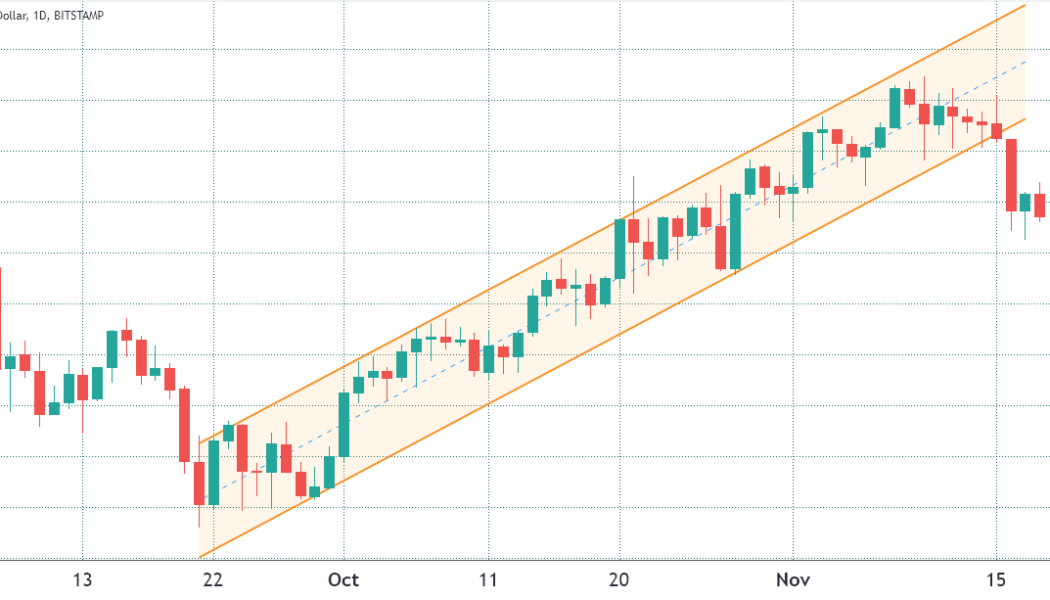Ether’s (ETH) 330% year-to-date gain has been largely fueled by the growth of decentralized finance and the explosion of non-fungible tokens. Proof of this comes from OpenSea, the largest NFT marketplace, surpassing the impressive mark of $10 billion in accumulated trading volume.
However, traders worry that the 15% correction that followed the $4,870 all-time high on Nov. 10 could indicate that a larger bearish movement is in place. The rupture of the 55-day ascending channel reinforces this thesis and Nov. 19’s $550 million Ether options expiry will likely favor bears.

Ethereum’s $86 billion total value locked in smart contract contracts, represents 70% of the market and this metric has increased by 25% over the last two months, signaling that the industry leader was not affected by the network’s $50 average gas fees.

Regulatory uncertainties, especially in the United States, have been eclipsing the cryptocurrency markets’ bull-run. For example, on Oct. 18, the New York Attorney General’s office gave a “cease and desist” order to two crypto lending platforms operating in the state.
On Nov. 1, the President’s Working Group on Financial Markets (PWG) released a report focused on stablecoins’ risks to users and financial stability. The report urged Congress to issue a federal prudential framework, invoking the jurisdiction of the SEC and CFTC.
More recently, on Nov. 16, U.S. lawmakers started to fight back against changes to tax reporting rules for cryptocurrency transactions above $10,000 in the newly passed infrastructure bill. A group of congresspeople called for revisions to exclude miners, validators and wallet developers for tax purposes under the Bipartisan Infrastructure Framework (BIF).
Whatever the reason behind the recent Ether price weakness, bulls’ excessive optimism on Friday’s ETH $550 million options expiry will likely give bears further ammo to pressure down the market.

At first sight, the $275 million worth of call (buy) options virtually match the $280 million value in ETH put (sell) instruments. Still, the 0.98 call-to-put ratio is deceptive because some of those prices now seem far-fetched.
For example, if Ether’s price remains below $4,400 at 8:00 am UTC on Nov. 19, only 7% out of the call (buy) options will be available at the expiry. So, there is no value in the right to buy Ether at $4,400 if it’s trading below that price.
Bears completely dominate Friday’s expiry
Below are the four most likely scenarios for the Nov. 19 expiry. The imbalance favoring either side represents the theoretical profit. In other words, depending on the expiry price, the quantity of call (buy) and put (sell) contracts becoming active varies:
- Between $4,000 and $4,100: 80 calls vs. 35,100 puts. The net result favors put (bear) instruments by $140 million.
- Between $4,100 and $4,200: 340 calls vs. 30,000 puts. The net result favors put (bear) instruments by $120 million.
- Between $4,200 and $4,400: 4,840 calls vs. 16,900 puts. The net result is $60 million favoring the put (bear) instruments.
- Above $4,400: 7,640 calls vs. 8,700 puts. The net result is even.
This crude estimate considers call (buy) options used in bullish strategies and put (sell) options exclusively in neutral-to-bearish trades. However, a trader could have sold a call option, effectively gaining a negative exposure to Ether above a specific price. Unfortunately, there’s no easy way to estimate this effect.
Bears have a clear shot at securing a $140 million profit
Currently, Ether price trades near $4,150, and there are incentives in place for bears to push ETH below $4,100 ahead of Friday’s expiry. In that case, their estimated profits reach $140 million.
On the other hand, considering Ether’s 12% correction over the past three days, bulls would be more than pleased to take a $60 million loss if the ETH expiry price happens above $4,200.
Avoiding a $140 million loss is the bulls’ best-case scenario right now, considering the bearish scenario caused by regulatory uncertainties.
The views and opinions expressed here are solely those of the author and do not necessarily reflect the views of Cointelegraph. Every investment and trading move involves risk. You should conduct your own research when making a decision.










